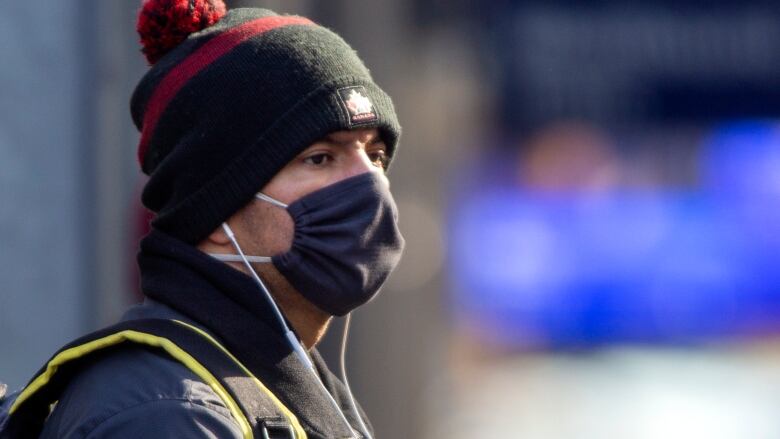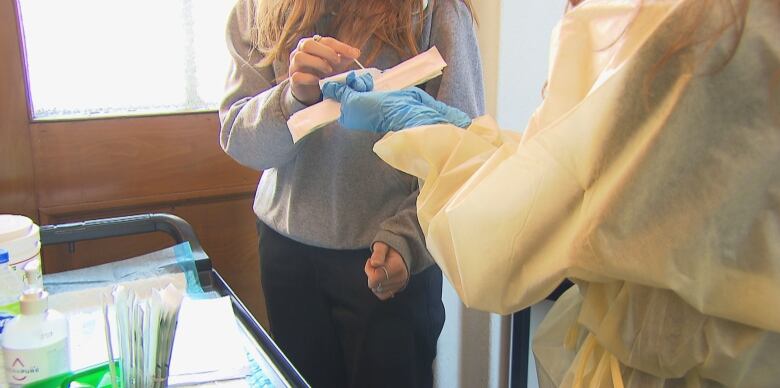Everything you need to know about COVID-19 in Alberta on Sunday, March 28
At least four in 10 new cases of COVID-19 in Alberta acquired through household transmission, Hinshaw says

The latest COVID-19 numbers:
- On Saturday, Alberta reported 668new casesof COVID-19 andone more death.
- At least four in 10 recent new cases of COVID-19 in Alberta were acquired through household transmission, Chief Medical Officer of Health Dr. Deena Hinshaw on Thursday.
- "The No. 1 riskiest activity is living in a household with someone who's infectious," Hinshaw said at a news conference.
- She urged household membersnot to treat the spread as inevitable. Instead, anyone with symptoms shouldstay away from other people in the household and get tested as soon as possible, said Hinshaw, notingthat free hotel rooms are available so people who need to canisolate outside the family home.
- She also warned the province is seeing spread across multiple settings, with people letting their guards down and not following public health rules at restaurants,fitness centres, workorsocial gatherings which are currently "against the rules,"she reminded people.
(Note the latest daily count of new cases in the above chart will usually vary slightly from the net new cases Alberta Health announces each day. For more on why, click here.)
- Saturday's tally brings the number of activecases in the province to 7,366, up from a low of just over 4,000 in February.
- In total, Alberta has seen 145,696 cases with 136,350recovered and 1,980deaths.
- There are 283people in hospital with the disease, 65of them in intensive care.
- Another 11,522coronavirustests were reported Saturday, with a positivity rate of about 5.7per cent.
- Lethbridgeis now considered a "hotspot" for COVID-19, with health officialsurging people to get tested afternumbers spiked recently in the city,largely due tonon-compliance with health measures.
The latest on more dangerous variants:
- Alberta has been contending with rising hospitalization numbers and a surge in cases linked tovariants of concern trends that have delayed plans for further easing public health restrictions.
- 207more cases were determined to be variants of concernin Friday's data update.
- That brings the total number of variant cases to 2,833, of which 1,803are active. That accounts for 24.5per cent of active cases in the province.
- A briefing being prepared for the Ontario government suggests the variants substantially increase the risk of serious illness and death when compared to earlier dominant strains of the coronavirus that causes COVID-19.
- Of those cases of variants of concern, 1,008people are deemed to have recovered while 22have died.
- Hospitals in Alberta are preparing for a third wave of the pandemic, driven by these more aggressive variants of the coronavirus.
- Almost all variant-of-concern cases in Alberta arethe strain first identified in the U.K. (B117) and 20 are the strain first identified in South Africa (B1351).
- Alberta has also identified five cases of the variant strain first identified in Brazil, known as P1.
The latest on reopening and restrictions:
- On Wednesday, Hinshaw warned thatadditional public health restrictions could be necessary in Alberta if there's a continued increase in variant cases which along with increasing overall case numbers were the main factors cited bythe government Mondaywhen it postponed moving to Stage 3 of reopening.
- Alberta has no plans to keep students home for an extra week during spring break, whichwas done after the winter holidays earlier this year,because the pandemic is not considered critical enough, Hinshaw said Thursday.
- According to the provincial plan, to move to Step 3 there must be fewer than 300 people in hospital, and thattotal must be declining. As of late, hospitalizations have been rising.
- Under the current restrictions,all indoor social gatheringsare limited to household members only.
- People who live alone can have up to two close contacts:
- These must be the same two contacts throughout the duration of the restriction.
- If the close contacts do not live alone, visits cannot be held at their home.
- Single parents who only live with their children under 18are permitted to have up to twoclose contacts.
- Outdoor social gatherings can have up to 10 people, but must follow all public health rules about masks andphysical distancing. The rules areenforceable with $1,000 fines.
- Retailstores and malls can have theircapacity to 25 per cent of fire code occupancy, and youth sports teams and activities are allowed to resume with up to 10 participants. Masks and physical distancing arestill required.
- Restrictions alsoeased for child, youth and adult performances, includingsinging, theatre and playing wind instruments, though participants must follow the same restrictions as for youth sports.
- Banquet halls, community hall and hotels canhost permitted performance activities, wedding ceremonies with up to 10 people, and funeral services with up to 20.
- Rules for indoor fitness still require that gym visits must be scheduled or by appointment no drop-insallowed.
- Low-intensity individual and group exercises areallowed without a trainer. Public health rules must be followed, including wearing masks and physical distancing.
- High-intensity activities without a mask are allowed only forone-on-one workouts with a trainer. Trainers must still be masked.
- No sports games, competitions, team practice or league play is allowed.
- Registration will begin in April for swim and skate lessons with the City of Calgary, which will host a maximum of 10 people in each class to maintain physical distancing.
The latest on the Pfizer-BioNTechandModernavaccines:
- About 74 per cent of Albertans aged 75 and older the demographic group most vulnerable to the disease have received COVID-19 vaccinations, Alberta Health confirmed Thursday.
- As of Saturday's update,577,223doses of vaccinehave been administered and95,452Albertans have been fully vaccinated with two doses.
- Alberta opened up appointments for the Pfizer-BioNTechandModernavaccinesto everyone eligible in Phase 2A on March 19 after starting the rollout on March 15. This means the following can book appointments:
- Anyone born in 1956 or earlier.
- First Nations, Mtis and Inuit people born in 1971 or earlier. (Those living on-reserve or on-settlement should book through a local clinic.)
- Staff and residents of licensed seniors supportive living facilitiesnot included in Phase 1.(Theywill receive a direct email from AHS with a unique link to go online and book their immunization appointments.)
- How to bookif you're eligible:
- Participating pharmacies:Now booking all eligible ages, no matter the birth year.
- Alberta Health Services (online or 811)
- First Nations, Mtis and Inuit people born in 1971 or earlier who are living on reserve or on settlementshould book through a local clinic.
- Vaccinations for those75 and older(born in 1946 or earlier) arestill available at thosepharmaciesas well as atimmunizationsites operated byAHSacross the province.
- The Alberta government laid out its plan on March 15forPhase 2Bof the vaccine rollout, which will be for people born 2005 to 1957 (ages 16 to 64) with certain high-riskunderlying health issueslikechronic conditions affecting certain organsand those suffering from cancer. For the full list of health conditions see here.It's expected that the timeline will be between April and June, but it will dependon supply.
- The governmentsaysPhase 2C of the rolloutwill include health-care professionals such as physicians, nurses, pharmacists, dentists andsupport staff. As well, designated support persons for those living in continuing care will also become eligible in the stage.
The latest onAstraZeneca-Oxford/Covishieldvaccine:
- As of March 10, Alberta began offering theAstraZeneca-Oxford/Covishieldvaccine as an option foradults who do not have a severe chronic illness in a staggered rollout toAlbertans born 1957 to 1971 and First Nations, Mtis and Inuit (FNMI) persons born 1972 to 1976.
- However, not everyone in those age ranges wasimmediately eligible: the province staggered the rollout starting with the oldest and expanding it a birth year or two at a timedepending on vaccine supply.
- The government says more appointments and birth years will be added as moreAstraZeneca supply becomes available.
- The U.S. has announced plans to send 1.5 million doses of AstraZeneca vaccine to Canada, which could arrive by the end of the month. Plans are still being worked out.
- Healthy Albertans in those age ranges can also choose to wait until Phase 2D begins in May to receive the Pfizer or Moderna vaccine if they don't want theAstraZeneca vaccine. However, AHS stressed thatAstraZenecahas beenproven to be highly effective in preventing serious illness and death in adults 18 to 64.
The latest on COVID-19rapid testing:
- Another two million free rapid testing kits are now being offered to public, private and not-for-profit employers and service providers, the Alberta government said Tuesday
- The announcement follows the earlierrollout of more than 1.2 million kits to long-term care facilities, schools, outbreak sites, hospitals, homeless shelters and industries across the province.

- Any employer or service provider can apply for the free test kits, the news release said.
- A COVID-19 rapid testing pilot project toscreen students and staff without symptoms is taking place at two northeastCalgary schools:
- Testing began March 18at Rundle School for Grades K-6, which has yet to reveal if any positive results were detected by the pilot project.
- Testing began March 22 atSt. John XXIII School for Grades K-9, which reported Thursday that testing had detected zero cases of COVID-19.
- Canadian energy giant Suncor will focus its COVID-19 rapid-testing efforts on hundreds of fly-in, fly-out workers that will be conducting planned maintenance in northern Alberta over the coming spring and summer.
See which regions are being hit hardest:
Here is thedetailed regional breakdownof active cases as reported Saturday by the province:
- Calgary zone:3,407, up from 3,246 (52,221 recovered).
- Edmonton zone: 1,624, up from 1,552 (53,827 recovered).
- North zone: 830, up from 798 (12,673 recovered).
- South zone: 805, up from799 (6,967 recovered).
- Central zone: 670,upfrom 654 (10,549 recovered).
- Unknown: 30,up from 28 (113 recovered).
Find out which neighbourhoods or communities have the most cases, how hard people of different ages have been hit, the ages of people in hospital, how Alberta compares to other provinces and more in: Here are the latest COVID-19 statistics for Alberta and what they mean
You can see active cases by local health area on the following interactive map. Scroll, zoom and click on the map for more information.
Here are the latest Alberta COVID-19 stories:
- For the latest on what's happening in the rest of Canada and around the world, seehere.
With files from The Canadian Press













_(720p).jpg)


 OFFICIAL HD MUSIC VIDEO.jpg)
.jpg)



























































































